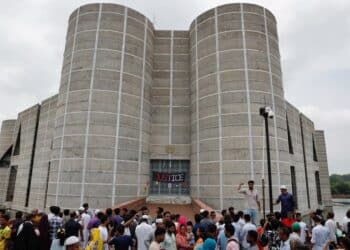Father’s Day, a celebration dedicated to honouring fathers and father figures, has its roots in the early 20th century. The idea for a day to recognize fathers was first proposed in the United States. It was inspired by the successful establishment of Mother’s Day. The inaugural Father’s Day was celebrated on June 19, 1910, in Spokane, Washington, thanks to the efforts of Sonora Smart Dodd, who wished to honour her father, a Civil War veteran and single parent who raised six children.
Over time, Father’s Day gained momentum and was celebrated in various parts of the United States. However, it was not until 1972 that President Richard Nixon signed it into law, officially recognizing the third Sunday in June as Father’s Day. This formalization marked a significant cultural acknowledgement of fathers’ pivotal role in families and society.
Father’s Day has evolved to embody various cultural and social significances. It is a day to express gratitude and appreciation for fathers’ contributions, sacrifices, and unconditional love. The celebration transcends biological connections, extending to grandfathers, stepfathers, and other male figures who have provided guidance and support.
Globally, Father’s Day is observed with unique traditions and customs. In countries like Australia and New Zealand, it is celebrated on the first Sunday of September. Conversely, many European and Latin American countries commemorate it on the 19th of March, coinciding with St. Joseph’s Day, a day honouring the Father of Jesus Christ. Each culture brings its flavour to the celebration, with activities ranging from family gatherings and special meals to gift-giving and public events.
In modern society, Father’s Day remains a cherished occasion. It serves as a reminder of fathers’ vital roles in nurturing and shaping the next generation. Despite the changing dynamics of family structures, the essence of Father’s Day persists, emphasizing the enduring importance of paternal love and guidance. As such, it continues to be a day of reflection, appreciation, and celebration of fatherhood in all its forms.
Father’s Day: The Role of Fathers in Family Life
Fathers have historically been seen as the primary providers and protectors of their families. While these roles remain significant, the modern fatherhood paradigm has expanded to encompass a more multifaceted set of responsibilities. Today’s fathers are expected not only to ensure financial stability but also to offer emotional support, serve as role models, and engage actively in their children’s upbringing. This evolution in the role of fathers reflects broader societal changes and a deeper understanding of the importance of paternal involvement in family life.
The dual expectation of providing financial stability and emotional support can be challenging. Fathers often find themselves juggling demanding careers with the need to be present and involved at home. This balance is crucial, as studies have shown that children with actively involved fathers tend to perform better academically, exhibit higher self-esteem, and develop healthier social relationships. The presence of a nurturing father can profoundly impact a child’s emotional well-being and overall development.
Moreover, fathers today are increasingly expected to share in household duties and caregiving responsibilities. This shift can alleviate some of the pressures traditionally placed on mothers, fostering a more equitable family dynamic. However, these broadened expectations can also contribute to a significant amount of stress and pressure for fathers. Balancing work commitments with family responsibilities often requires careful time management and a supportive partner.
Societal pressures and stereotypes about masculinity can further complicate the role of fathers. The expectation to be the ‘strong, silent type’ can sometimes hinder open emotional expression, which is essential for a healthy family environment. Nonetheless, many fathers are actively working to break down these stereotypes, embracing a more open and communicative approach to parenting.
Personal anecdotes from fathers highlight the joys and challenges of modern fatherhood. For instance, one father shared how guiding his child through their first steps was a profoundly rewarding experience, balancing the demands of his job to be there for such milestones. Another recounted the struggle of managing late-night feedings while preparing for important work meetings the next day. These narratives illustrate the diverse and dynamic roles fathers play in their families.
Statistics further underline the importance of engaged fatherhood. For example, a study by the National Center for Fathering revealed that children with involved fathers are 39% more likely to earn mostly A’s in school, 45% less likely to repeat a grade, and 60% less likely to be suspended or expelled. These figures underscore the tangible benefits of a father’s active presence in a child’s life.
In essence, the role of fathers in family life is complex and evolving. As society continues to recognize the critical contributions fathers make, it is imperative to support and celebrate their efforts, acknowledging the unique challenges they face and the invaluable impact they have on their families.
Celebrating Fathers: Ideas and Activities
Father’s Day offers a unique opportunity to honour and celebrate the unsung efforts of fathers. To make this day special, consider a variety of personalized gifts, creative DIY projects, and memorable experiences that can be shared between children and their fathers. Personalized gifts such as custom-made photo albums, engraved watches, or tailored clothing items can serve as heartfelt tokens of appreciation. These gifts not only show thoughtfulness but also capture cherished memories and moments.
For those inclined towards creativity, DIY projects provide a personal touch that store-bought items often lack. Simple yet meaningful projects such as hand-painted mugs, homemade greeting cards, or crafted photo frames can be enjoyable for children to create and highly valued by fathers. These handmade gifts speak volumes of the time and effort invested, making them priceless keepsakes.
Memorable experiences are another excellent way to celebrate Father’s Day. Planning a family outing, such as a picnic in the park, a day at the beach, or a hiking trip, allows for quality time spent together. These activities not only create lasting memories but also strengthen family bonds. Alternatively, organizing a surprise celebration, complete with a favourite meal or an evening of games and movies, can make the day truly unforgettable for fathers.
In addition to these specific ideas, simple gestures of appreciation can also make a significant impact. Writing a heartfelt letter, expressing gratitude verbally, or even spending uninterrupted time together can convey deep appreciation for a father’s efforts. It is essential to remember that while Father’s Day provides a dedicated moment to celebrate fathers, acknowledging and appreciating their contributions should be a continuous effort throughout the year. Consistent recognition helps reinforce the value of their role within the family.
By incorporating personalized gifts, creative DIY projects, and memorable experiences, families can create a meaningful and heartfelt celebration of Father’s Day. Beyond the day itself, maintaining a culture of appreciation ensures that fathers’ efforts are recognized and valued all year round.
The Future of Fatherhood: Evolving Roles and Expectations
In the 21st century, the role of fathers is undergoing significant transformation, influenced by cultural shifts and evolving family dynamics. Traditionally, fathers were often seen as the primary breadwinners, while mothers took on the majority of caregiving responsibilities. However, this paradigm is changing as society moves towards increased gender equality. Fathers are now more actively involved in raising their children, challenging long-standing stereotypes about paternal roles.
One of the most notable changes is the rise in stay-at-home dads and the redistribution of household responsibilities. With more women entering the workforce and pursuing careers, fathers are stepping up to share the load of childcare and domestic tasks. This shift not only promotes a balanced family life but also fosters a more inclusive environment for children, who benefit from the diverse parenting styles of both parents.
Support systems play a crucial role in this evolving landscape. Paternity leave policies, for instance, are becoming more prevalent in various countries, allowing fathers to take time off work to bond with their newborns and support their partners. These policies not only emphasize the importance of paternal involvement but also help to normalize the idea of fathers as primary caregivers.
Moreover, fatherhood support groups and community initiatives are emerging, providing a platform for fathers to share experiences, seek advice, and offer mutual support. These groups help fathers navigate the challenges of modern parenting, reinforcing the notion that seeking help and sharing responsibilities is both necessary and acceptable.
Despite these positive changes, there is still a pressing need to continue recognizing and supporting the evolving role of fathers. Society must challenge outdated notions of masculinity that discourage emotional expression and active caregiving. By doing so, we can create a more supportive environment that values and honours the contributions of fathers in all their forms.
*Mimiola is an award-winning journalist and media entrepreneur.











